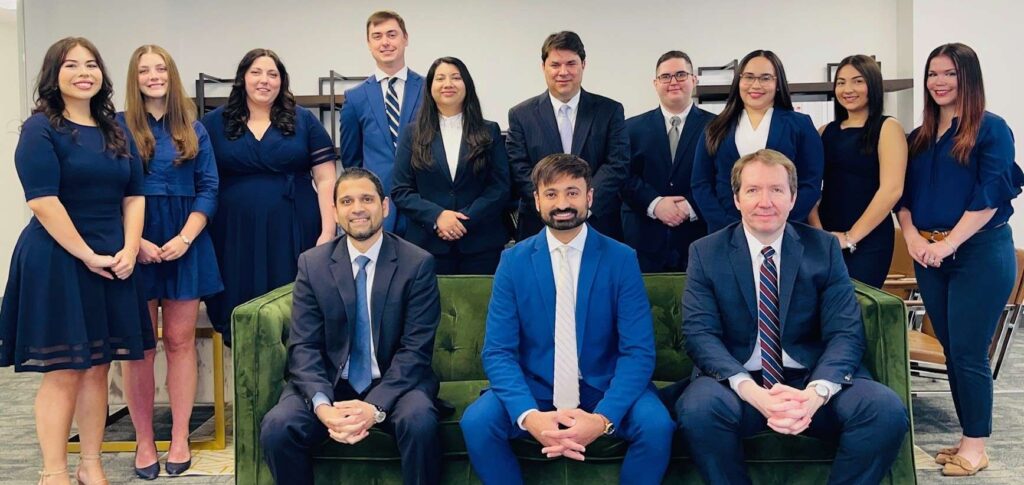Austin FDCPA Attorneys Stopping Abusive Debt Collectors
If you’re being harassed by debt collectors in Austin, Texas, you’re not alone—and you have rights. The Fair Debt Collection Practices Act (FDCPA) is a federal law that protects consumers from abusive, deceptive, and unfair debt collection practices. At Texas Debt Law, our experienced Austin FDCPA attorneys have successfully represented hundreds of clients just like you—fighting back against illegal collection tactics, stopping the harassment, and securing financial compensation.
We understand how stressful debt collection can be, especially when collectors cross the line. Whether you’re being called at work, threatened with lawsuits, or receiving misleading letters, we’re here to help you stand up and take control.

What Is the FDCPA?
The FDCPA is a federal law passed in 1977 to regulate third-party debt collectors—those who collect debts on behalf of others, such as collection agencies, law firms, or debt buyers. It does not apply to original creditors (like your bank or credit card company), but it does apply to many collectors you may be hearing from now.
Under the FDCPA, you have the right to be treated with dignity, transparency, and fairness. When collectors violate these rules, they can be held accountable—and you may be entitled to statutory damages up to $1,000, plus actual damages and attorney’s fees.
Common FDCPA Violations We See in Austin, Texas
At Texas Debt Law, we regularly handle a wide range of FDCPA violations. Below are some of the most common illegal actions we pursue:
1. Harassing Phone Calls
Collectors are not allowed to:
- Call before 8 a.m. or after 9 p.m.
- Call you at work if you told them not to
- Call repeatedly or continuously with the intent to annoy, abuse, or harass
- Use profane or abusive language during phone calls
If your phone is ringing off the hook or you’ve been cursed at or belittled, that may be a clear FDCPA violation.
2. Misrepresentation and False Statements
Debt collectors often break the law by:
- Claiming you owe more than you actually do
- Pretending to be an attorney or government official
- Threatening arrest, lawsuits, or wage garnishment without legal basis
- Misstating the consequences of not paying
Any false, deceptive, or misleading communication may give rise to an FDCPA claim.
3. Failing to Provide a Written Debt Validation Notice
Collectors must send you a written notice within five days of their first contact, informing you of:
- The amount of the debt
- The name of the creditor
- Your right to dispute the debt within 30 days
If they fail to send this notice—or continue collecting without verifying the debt after you dispute it—they’ve broken the law.
4. Communicating With Third Parties
Collectors cannot disclose your debt to:
- Your family
- Your employer
- Your neighbors or friends
They can only communicate with your attorney, a credit bureau, or the courts—unless you’ve given explicit permission otherwise.
5. Contacting You After You Request No Contact
If you send a cease and desist letter, or inform them you’re represented by an attorney, the collector must stop contacting you. Any further contact may be a violation.
Signs You May Have an FDCPA Case
If you’re unsure whether your rights have been violated, ask yourself the following:
- Have I received threatening or abusive calls?
- Did the collector fail to tell me who they are and what the debt is for?
- Did I ask them to stop contacting me—and they kept calling anyway?
- Have they contacted my job or family members?
- Are they attempting to collect a debt I don’t owe or already paid?
- Have they lied about legal actions, interest rates, or penalties?
If you answered yes to any of these, call us today for a free case evaluation.
How Our Austin FDCPA Attorneys Can Help
At Texas Debt Law, we don’t just stop the calls—we fight for compensation. Here’s how our team of consumer protection attorneys in Austin can help you:
1. Evaluate Your Claim for Free
We start with a thorough review of the collection history and communications. If we find FDCPA violations, we’ll move forward at no cost to you. We only get paid if we win.
2. Send a Cease-and-Desist Letter
We’ll immediately notify the debt collector that you’re represented by counsel and demand they cease further contact. This can give you peace of mind and a break from the harassment.
3. File a Lawsuit on Your Behalf
We’ll file a federal lawsuit if warranted, seeking:
- Up to $1,000 in statutory damages
- Compensation for emotional distress or lost wages (if applicable)
- Attorney’s fees and court costs
These lawsuits are often settled quickly—because the law is on your side.
4. Negotiate Your Debts from a Position of Strength
If you do owe a valid debt, we can often negotiate better terms once the collector knows you’re represented. Our goal is always to protect your credit, your rights, and your finances.
Why Choose Texas Debt Law?
There are many attorneys in Texas, but few focus exclusively on consumer protection law like we do. Our Austin-based FDCPA attorneys are highly experienced in federal debt collection laws, and we’ve built a reputation for being aggressive advocates for our clients.
Here’s what sets us apart:
- Dedicated FDCPA Practice: We don’t dabble—we specialize in credit and debt collection cases.
- Results-Oriented: We’ve recovered millions in compensation for consumers across Texas.
- No Fee Unless We Win: We don’t charge upfront. If we take your case, it means we believe we can win it.
- Local Knowledge: We understand how Texas courts, collectors, and consumers operate. You’ll work with real attorneys—not call centers.
What You Should Do Right Now
If you believe a debt collector has crossed the line:
- Keep All Evidence – Save letters, voicemails, call logs, text messages, and screenshots.
- Write Down Details – Document the name of the caller, what they said, and when.
- Don’t Pay Until You’re Sure – Don’t make any payments or promises until you’ve confirmed the debt is valid.
- Call Texas Debt Law – Our FDCPA attorneys in Austin are ready to help.
The Bottom Line
You don’t have to suffer in silence. The FDCPA is a powerful law—but only if you use it. At Texas Debt Law, our Austin Texas FDCPA lawyers are ready to protect your rights, stop the harassment, and pursue justice. Whether you’ve received threatening letters or misleading calls, we will hold collectors accountable and get you the compensation you deserve.
Call us today at (512) 503-2070 or contact us online for your free case review. Let Texas Debt Law stand between you and the debt collectors—and start reclaiming your peace of mind.
Serving Austin and Beyond
While we’re based in Austin, Texas, Texas Debt Law proudly represents consumers statewide in FDCPA and credit reporting cases. We offer virtual consultations, document review, and federal representation—because your rights matter, no matter where you live in Texas.
Texas Debt Law — Texas Consumer Protection Attorneys Who Fight Back.
h3 style=”text-align: center;”>(512) 503-2070
